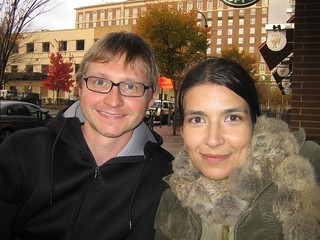Tuesday morning: Michael, David and Federico initialize the
conference.
I was first out giving an invited talk, and I could start before schedule given that everyone was in place - that was great, I didn't have to feel pressed for time and talk quickly in order to get to
say everything I want to say.
I started
my talk by telling about a letter I got this summer from a Masters' student in Canada.
He had read the thesis on Story Construction I wrote in 2001/2002 and wondered
about my thoughts on how the field have advanced during the past decade. Since
I got that letter I've been thinking a lot about this, and realized that there have
been huge strides made. Even though it often feels like trampling in the mud,
and that the area just creates tool after tool that no author wants to touch,
and that we just keep doggedly chasing after grails that we don't even know if
they exist... We have found pretty cool goblets on the way, and that constant
chase is what can keep us going. I named a few of the grails many of us keep
looking for, then, I gave a recount on my journey, and what I found on the way.
I told about the play-testing about the Pataphysic institute, of how players
- simultaneously use mental models of how a mind works and that of MMORPG role taking in battle,
- how they co-create boss monsters with the system, and how intense it can become when they play, and an autonomous entity in the game bleeds in meaning from the real world, but how that is re-interpreted in dialog when players cooperate to neutralise the negative feelings that these boss monsters represent,
- how players attribute intentionality to the autonomous entities despite that they even authored them themselves. Still, they read in and interpret their behaviour as if was something that would have its own will.
- simultaneously use mental models of how a mind works and that of MMORPG role taking in battle,
- how they co-create boss monsters with the system, and how intense it can become when they play, and an autonomous entity in the game bleeds in meaning from the real world, but how that is re-interpreted in dialog when players cooperate to neutralise the negative feelings that these boss monsters represent,
- how players attribute intentionality to the autonomous entities despite that they even authored them themselves. Still, they read in and interpret their behaviour as if was something that would have its own will.
Then I went
on to note that we have indeed achieved to come closer to some of the grails we
thought about ten years ago. For example, we know now thanks to the Sims series,
that it indeed is possible to have a sandbox world as a basis for performing
actions that in turn can be a sequence of event that, when retold, actually
becomes an engaging narrative. The blog stories of Alice and Kev is an example
of that. Another dream, an authoring environment that can take the rules
implied in language and use them in a functional way is manifest in Inform 7
and its constant development. And "the book that writes itself",
generative planned stories, we are coming along in that area too. Of that,
Richard Evans' and Emily Shorts Versu is a prime example. Richard talked about
this the day after. It felt really nifty that we had worked together on our
talks the day before, because then I could just talk about this, our past grails
and where we seem to be now, grail-wise, because then, on the last day of the
conference, Noah gave a talk on the future of digital interactive narrative.
Along the conference I noted that one of the grails that shine most brightly is
that of the automated game master. That is, something more than the state of
the art/general idea of an automated story manager. An automated game master
would also use the game mechanics afforded in a game world together with
judgements about how to use plot-points, story-beats, levels of dramatic
tension and what-not. Of course, the idea of automating, or having support for
the human game master of a table top or live action game is not new, it was
just, as topics go, quite a shiny one.
ICIDS was a
single track conference, which I was thankful for. I get so frustrated of this
condition that you have gone somewhere to be, and to see, and to participate,
but then anyway ending up feeling that one misses crucially interesting talks
all the time, because one has to choose. (GDC solves this by having the GDC
Vault where the talks are recorded, that's the only reason I don't go nuts
there).
Below are
some pictures of how the day in this blissfully single track continued. The
conference program is available here: http://icids2012.vicomtech.tv/files/Program.pdf
In the
evening, we had a delightful time. I took a picture of myself and Hartmut, and
tried to take it the same way as last time I saw him, which was seven years ago
when we were both at Georgia Tech. We were about fifteen-twenty people, and we
did dinner the way that seem to be the local custom: to go from different bars
and have a pinto at each one. Many interesting conversations, I was for example
very intrigued to hear about Uli Spierling's work of using the STRIP planning language
as the base for a prototype that let authors experiment with interactive
Storytelling.
2012:
2005












